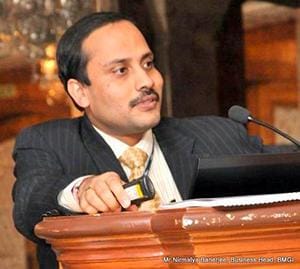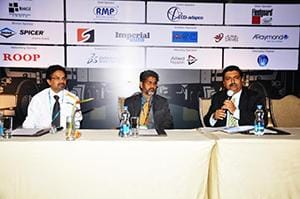As the strategic advisor for India Commercial Vehicle Summit 2013, held in Westin, Pune on the 4th and 5th of April 2013, BMGI presented the roadmap for innovation for the Indian CV Industry. The event was organized by Shanghai based Lnoppen who facilitates business through events and market research across Asia & Europe. The event comprised thought leaders from across the world from the commercial vehicle industry with senior management representations from OEMs, Tier 1 & Tier 2 suppliers that included Ashok Leyland, JAC Motors, Daimler India Commercial Vehicles, John Deere, Volvo-Eicher Commercial Vehicles, Volkswagen, to name a few.
 The event was kicked off by the chairman Mr Naresh Raisinghani, CEO & Executive Director, BMGI, who pondered on the “India Story” for the Commercial Vehicle Industry. He outlined the key challenges that the industry confronts today that include managing customer preferences and managing the input costs, besides the total cost of ownership and the strict environmental norms. Mr Raisinghani identified two key enablers that can be leveraged: the latent need and the support available. Given India’s vehicle density on the lower side coupled with the planned spending on the infrastructure (40% on ports & roads till 2020) he left the group with the question “Is the current gloomy picture just a blip?”
The event was kicked off by the chairman Mr Naresh Raisinghani, CEO & Executive Director, BMGI, who pondered on the “India Story” for the Commercial Vehicle Industry. He outlined the key challenges that the industry confronts today that include managing customer preferences and managing the input costs, besides the total cost of ownership and the strict environmental norms. Mr Raisinghani identified two key enablers that can be leveraged: the latent need and the support available. Given India’s vehicle density on the lower side coupled with the planned spending on the infrastructure (40% on ports & roads till 2020) he left the group with the question “Is the current gloomy picture just a blip?”
Shri. Jeevanrao Gore, Chairman of MSRTC stressed on the importance of public transport highlighting the reduction in emissions and fuel consumption. Substantiating on the event chairman’s India story, Mr Amit Kaushik, Principal Analyst, Truck Forecasting / Advisory, IHS Automotive, presented the trends and growth drivers for the industry. While the global markets are affected by high unemployment rates and the euro crisis, the GDP growth and business confidence indicators (Purchasing & New Orders) seem to be in favour of India further validated by the shifting of the global output towards emerging markets like India. Mr Kaushik hypothesized that if the motivation for purchase today is price and brand of the commercial vehicle, it would be the total cost of ownership & service offered by 2020.
Supporting the India Story, Mr Sudhir Mehta, director of Force Motors in his talk on “Behaviour of Different Competitive Forces Driving the CV Industry, During The Next 5 Years” conjectured that the centre of action will shift to rural emerging markets. With schemes like NREGA, the rural market has witnessed increased income causing higher consumption in turn causing higher demand for goods leading to higher transportation requirements, he shared. With the LCVs forming about two-thirds of the market share in Indian CVs, Mr Mehta believes that the rural Indian story remains solid.
The drivers and restraints for the India story was re-emphasized by Mr Nitin Seth, Executive Director, LCV, Ashok Leyland, as he shared his thoughts on the “Future of CV Industry”. Mr Seth believes while restraints like political instability and increasing inflation could pose a threat to the Indian CV scenario, the increasing disposable income and increased spending by the Government for infrastructure development provide a hope for India. The entry of global OEMs and India’s preference to road over rail as the mode of freight goods reaffirms the promise, he added. Mr Seth shares that the goods LCVs are predicted to grow at a CAGR of 16.9% while the M&HCVs are pegged at 7.24%. He endorsed the earlier stated views that the Indian truck market would eventually move to optimum-cost market from the current low-cost market.
Reinforcing the above thoughts on the market drivers was Mr Vivek Kumar, Associate Director of CRISIL, who identified the availability of credit as one of the key enablers for CV sales. The challenge of railways posing a competition was further re-emphasized besides the ability to manage competition. Mr Ramashankar Pandey, Managing Director of Hella Lighting, focused on the flipside of the India Growth Story as he recollected the statistics of road accidents which are currently 1 every minute resulting in 1 death every 4 minutes. He criticized the tendency to assign the fault to the driver and urged people take a more responsible stance by shifting the focus on use of technology by the automotive aftermarket companies. Mr Pandey recounted the initiatves by Hella towards this direction and mentioned about the Club D2S campaign that is an inclusive campaign intended to sensitize people about road safety and road sense. He mentioned about the importance of lighting and the quality of lighting that improves visibility which is a significant factor in preventing accidents.
 With the GDP growth touted as the slowest in a decade, how would a typical CV maker react? Mr Nirmalya Banerjee, Business head, BMGI probed the audience with a teaser and asked them if it was through cutting costs? He said that in cutting the costs, solution is denied to the customer and it is the customer who stands to lose. With the average company lifespan reducing consistently, the process of growth, Mr Banerjee said, can only be supported by Innovation as he shared how Innovation can be incubated in CV Industry for exponential growth. Outlining four growth strategies, he contrasted the differences in thinking process between the traditional and the innovation based thought. He presented the structure of Rapid Innovation Events (RIE), which is BMGI’s unique methodology to bring concepts to action. The RIE is a journey towards the ideal solution which banks on a set of tools to generate “edge of the circle” ideas, he explained, before taking the members through a case study as applied to a company in the CV industry.
With the GDP growth touted as the slowest in a decade, how would a typical CV maker react? Mr Nirmalya Banerjee, Business head, BMGI probed the audience with a teaser and asked them if it was through cutting costs? He said that in cutting the costs, solution is denied to the customer and it is the customer who stands to lose. With the average company lifespan reducing consistently, the process of growth, Mr Banerjee said, can only be supported by Innovation as he shared how Innovation can be incubated in CV Industry for exponential growth. Outlining four growth strategies, he contrasted the differences in thinking process between the traditional and the innovation based thought. He presented the structure of Rapid Innovation Events (RIE), which is BMGI’s unique methodology to bring concepts to action. The RIE is a journey towards the ideal solution which banks on a set of tools to generate “edge of the circle” ideas, he explained, before taking the members through a case study as applied to a company in the CV industry.
Substantiating the need for imbibing true world class practices, pictured as the third key shift the CV Industry was headed to, Mr Christian Kellner, Head – Truck Operating System, India, Daimler India Commercial Vehicles showcased Daimler’s Truck Operating System (TOS) and the importance of standardizing operations in the shop-floor through Daimler’s journey in adopting best practices across geographies. Mr Kellner elaborated the procedure through which Daimler benchmarked some of the practices involving the people on the shop-floor – which also meant, demonstrating through mocks, the processes and practices that have not yet been transitioned into India.
Speaking about the entry of global OEMs to India, Ms Jina Kang of JAC Motors, with presence in over 100 countries that has demonstrated a rapid growth in sales for 21 years shared JAC’s plans to enter India. With a unique management system that looks at technology, management, system and marketing innovation, it is not a surprise that JAC introduced the first bus chassis of the nation and has since been the biggest chassis manufacturer, she added. On the lookout for a partner in India, Ms Kang revealed JAC’s plans to setup its CKD operations within 2 years and looks at India as the global manufacturing base.
With the transport sector heavily dependent on oil, is today’s transport mechanism sustainable? The double-bind we find ourselves with today: how to replace the oil consumed and how to reduce the CO2 emitted, seemed to find an answer through Mr Thulin Krister, Director, Business & Coach, Scania Commercial Vehicles India, who made a case for Biogas & Bioethanol powered vehicles. He reminded the participants that it is a city dominated world with the cities only expected to grow to mega-cities leading to higher deaths in the world due to air pollution. The director of the 122 year old company emphasized to clean up the cities by using vehicles that are powered by biogas – generated by using waste from cities and bio-ethanol.
Sharing the view on depleting oil resources, Mr Sudipta Roy of Tara International projected the need for electric mobility in India. Mr Shridhar Bendke of Mint Biofuels outlined the challenges & prospects of green energy & technology. He described the bio-diesel process followed at Mint before narrating the advantages, which includes producing 80% less Carbon dioxide and almost 100% less sulphur dioxide with the disadvantages of being inoperable during winters and need for frequent replacement of filters. Mr Bendke described the driving factors for bio-based lubricants that include search for environmentally friendly materials with potential to replace mineral oils owing to the depletion of world fossil fuel reserves.
What is the impact of a low weight CV & sub-assembly level improvements on emissions? Mr Nandkumar Khandare, CEO, Nissan – Ashok Leyland Technologies looked to answer this question by noting that the forces acting against the prime mover – resistance to acceleration, rolling and gradient besides aerodynamics. He shared that reducing the vehicular weight not only saves metal and its processing energy, but, helps to stop the vehicle quickly. Sharing that the Indian driving context requires a significant part of the energy in managing the tyres and the driver behaviour, improving combustion efficiency and electrification of accessories could counter this in addition to meeting the emissions challenge.
Perhaps as an aid to innovating at the subsystem level, Mr Amit Kasliwal of CD-Adapco India shared how 3D modelling can provide more detailed visualization and understanding of the flow processes within the engine in a CV. This will provide a closer opportunity to save cost on the material, he stressed. Sree Harsha from Dassault Systems addressed issues from Designs through technology to Manufacturing. He began with the challenges CV manufacturers face – new ownership experience; new geographical focus; local market driven business and managing the aftermarket.
 The CEO of RMP Bearings, Mr Praveen Kumar, showcased the company’s abilities in design and innovation in its products which is evident from the fact that it is the first company to manufacture sheet metal yokes. Mr Kumar emphasized the need for innovation not just at the OEM level, but, also at the sub-system level. Echoing the thought of indigenous development capabilities to enhance the effectiveness of the Commercial Vehicles, Mr Sadashiv Pandit, Executive Chairman, Fleetguard Filters Pvt Ltd mapped the aggressive growth plans banking on their design capabilities.
The CEO of RMP Bearings, Mr Praveen Kumar, showcased the company’s abilities in design and innovation in its products which is evident from the fact that it is the first company to manufacture sheet metal yokes. Mr Kumar emphasized the need for innovation not just at the OEM level, but, also at the sub-system level. Echoing the thought of indigenous development capabilities to enhance the effectiveness of the Commercial Vehicles, Mr Sadashiv Pandit, Executive Chairman, Fleetguard Filters Pvt Ltd mapped the aggressive growth plans banking on their design capabilities.
In a panel discussion moderated by Mr Raisinghani, with Mr Nandkumar Khandare, CEO, Nissan-Ashok Leyland technologies & Mr Partho Roy, Asst. Vice President, Foton Motors on the panel, the broad themes of discussion were if the growth would really happen given the gloom. It was felt by the panel that this is a passing phenomenon as the nature of the industry is cyclical. The panel concluded that if one takes a step back, one would notice that the industry is actually growing. Mr Khandare stressed that this business is a necessity as if we look around, everything we see would have travelled in a CV in some form at least once in its lifetime. With this big a scope, the industry is bound to grow.
The second theme of discussion revolved around the new players and the existing players and if the new players posed a threat to the existing ones. Mr Roy opined that there is no necessity that the old player would have to move away, with the market as huge as it is, there is room for all. Mr Khandare felt the larger players need to have a strategy in order for growth. The panel looked at the joint ventures and pondered about the time when the foreign companies collaborated for understanding the local market. It was collectively agreed that a JV may not necessarily fail; it is needed to synergize the technology, market and the investments.
A disciplined approach is required to solving problems at the shop-floor that would lead to increasing utilization and efficiencies and would in turn lead to improving the capacity and productivity, shared Mr Ajay Kavade, AGM Body Shop, Volkswagen. He took the audience through a case study and demonstrated that using tools like Ishikawa diagram to identify the causes and working with the root cause would yield substantial improvements.
To manage the challenges of increasing customer expectations while keeping an eye on profitability creates a need for business excellence within organizations. This has the potential to fuel organizational growth at rates higher than 20% CAGR explained Mr Pradip Parode, Deployment Head, Business Excellence from John Deere. Outlining the structure of business excellence, Pradip detailed the elements of John Deere’s Business Excellence blocks which included Innovation. He explained how BMGI’s SCORE™ methodology of problem solving has helped John Deere achieve its organizational objectives year on year. He shared the importance of involving the leadership and top management in identifying the improvement opportunities and the structure of driving this to the deployment level. He signed off collating the benefits out of the initiatives that included a cumulative bottom line addition of 8 million USD.
About BMGI
BMGI is a global consulting firm that specializes in providing management consulting solutions in strategy, innovation, problem solving and business transformation. Headquartered in Longmont, USA, BMGI has offices in 13 countries around the globe. In India, BMGI is located in Mumbai.
BMGI\’s business strategy consultants work with organizations to build and execute successful strategy implementation and drive growth. BMGI leads in building a culture of innovation across the enterprise that transcends from top management to the lowermost execution level. BMGI partners with organizations in leveraging and promoting innovation. BMGI helps organizations solve problems harnessing the power of cutting edge techniques. BMGI’s Problem Solving capabilities have made it known world over as the best operations excellence consulting firm.
BMGI with its deep understanding of changing trends in nature of markets, preferences of customers and expectations from stakeholders offer the Business Advisory Services to its clients to help them align with the right designing and execution of strategy for successful businesses transformations.
A few major clients BMGI has worked with in India include Volkswagen, John Deere, Fiat, Daimler, Bajaj Auto, Reliance Industries, ITC, Vodafone, Asian Paints, L&T, Accenture, and Oracle.
To view the photographs, please click on the links given below:
Naresh Raisinghani, Event Chairman, CEO & Executive Director, BMGI
Mr Nirmalya Banerjee, Business Head, BMGI
Panel Discussion
For press backgrounder on Breakthrough Management Group International (BMGI) click here
Media contact details
Vishnupriya Sharma,
Breakthrough Management Group International (BMGI),
+91 (22) 40020045,
press@bmgindia.com
Deepak Panda,
Breakthrough Management Group International (BMGI),
+91 (22) 40020045,
press@bmgindia.com
